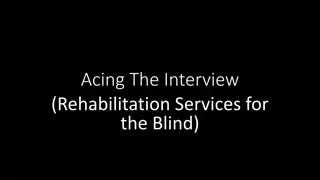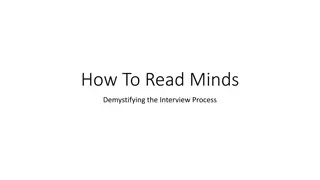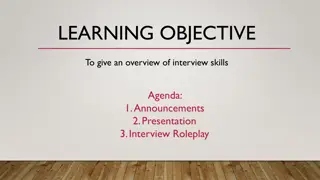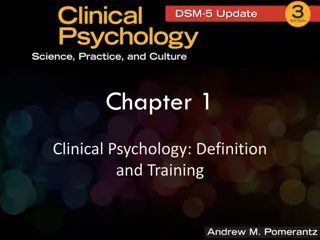Essential Aspects of the Clinical Interview in Psychology
Clinical interviews play a crucial role in the assessment conducted by clinical psychologists, showcasing essential qualities like validity, reliability, and clinical utility. Understanding the importance of feedback and honing general and specific skills as an interviewer are key components in conducting effective clinical interviews.
Download Presentation

Please find below an Image/Link to download the presentation.
The content on the website is provided AS IS for your information and personal use only. It may not be sold, licensed, or shared on other websites without obtaining consent from the author.If you encounter any issues during the download, it is possible that the publisher has removed the file from their server.
You are allowed to download the files provided on this website for personal or commercial use, subject to the condition that they are used lawfully. All files are the property of their respective owners.
The content on the website is provided AS IS for your information and personal use only. It may not be sold, licensed, or shared on other websites without obtaining consent from the author.
E N D
Presentation Transcript
Chapter 8 The Clinical Interview
The Clinical Interview Assessment is closely linked with the identity of clinical psychologists No other mental health profession incorporates assessment into their work as clinical psychologists do Clinical interviews are the most frequent assessment tool More than any specific test Vast majority of practicing clinical psychologists use interviews
Essential Qualities of Assessment Techniques All assessment techniques (including interviews) should have adequate: Validity measures what it claims to measure Reliability yields consistent, repeatable results Clinical utility benefits the clinician and ultimately the client
Validity, Reliability, and Clinical Utility Validity measures what it claims to measure. Content validity has content appropriate for what is being measured. Convergent validity correlates with other techniques that measure the same thing. Discriminant validity does not correlate with techniques that measure something else. Reliability yields consistent, repeatable results. Test-retest reliability yields similar results across multiple administrations at different times. Interrater reliability yields similar results across different administrators. Internal reliability consists of items that are consistent with one another. Clinical utility improves delivery of services or client outcome.
Feedback Common to all kinds of psychological assessment Provide results of tests or interviews May be face-to-face, a report, etc.
The Interviewer General skills Quieting yourself Minimize excessive internal, self-directed thoughts that detract from listening Being self-aware Know how you tend to affect others interpersonally, and how others tend to relate to you Develop positive working relationships Can segue into psychotherapy Respectful and caring attitude is key
The Interviewer (cont.) Specific behaviors Listening the primary task of the interviewer, consisting of numerous building blocks Eye contact Body language Vocal qualities Verbal tracking Referring to client by proper name
Components of the Interview Rapport Positive, comfortable relationship between interviewer and client How an interviewer is with clients Technique What an interviewer does with clients Directive vs. nondirective styles
Specific Interviewer Responses Open-ended and closed-ended questions Open-ended questions Allow individualized and spontaneous responses from clients Elicit long answers that may or may not provide necessary info Closed-ended questions Allow less elaboration and self-expression by the client Yield quick and precise answers
Specific Interviewer Responses (cont.) Clarification Question to make sure the interviewer accurately understands the client s comments Confrontation For discrepancies or inconsistencies in a client s comments Paraphrasing Restatement of client s comments to show they have been heard
Specific Interviewer Responses (cont.) Reflection of feeling Echo client s emotions, even if not explicitly mentioned Summarizing Tie together various topics, connect statements that may have been made at different points, and identify themes
Pragmatics of the Interview Note-taking Little consensus about note-taking Provide a reliable written record, but can be distracting to client and interviewer Audio- and Video-recording Also provide a reliable record, but can be inhibiting to clients Must obtain permission
Pragmatics of the Interview (cont.) The Interview Room Professional yet comfortable Confidentiality Explain confidentiality and its limits to clients (e.g., child abuse, intention to harm)
Types of Interviews Intake interviews To determine whether to intake the client into the agency or refer elsewhere
Types of Interviews (cont.) Diagnostic interviews To provide DSM diagnosis Structured interviews often used Minimize subjectivity, enhance reliability SCID is an example Currently being revised for DSM-5 Semi-structured interviews include some structure but also some flexibility or opportunities to improvise
Types of Interviews (cont.) Mental status exam Typically used in medical settings To quickly assess how a client is functioning at that time Crisis interviews Assess problem and provide immediate intervention Clients are often considering suicide or other harmful act
Cultural Components Appreciating the cultural context Knowledge of the client s culture, as well as the interviewer s own culture For behavior described or exhibited during interview Acknowledging cultural differences Wise to discuss cultural differences rather than ignore Sensitive inquiry about a client s cultural experiences can be helpful























